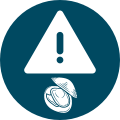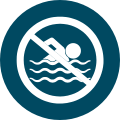
Our vision:
A safe and healthy Kitsap County for all.
Swimming Beach Monitoring
The Kitsap Public Health District's Water Pollution Identification & Correction (PIC) program protects public health and prevents fecal pollution in Kitsap County surface waters.
Health District staff sample dozens of streams and swimming beaches across the county for fecal bacteria, an indicator of fecal pollution caused by human or animal waste. Fecal pollution can carry viruses and harmful bacteria that make people sick.
We use water sampling results to notify the public of potential health risks, and to find and fix fecal pollution problems. This helps keep our streams, swimming beaches and shellfish beds safe and healthy for the public to enjoy.
Read the 2025 Water Quality Monitoring Report
During the summer months, we monitor popular fresh and saltwater swimming areas for fecal bacteria. Fecal bacteria are a sign that there is pollution from human or animal poop in the water. This pollution can carry bacteria, viruses, and other germs that make people sick.
From spring through fall, we also monitor freshwater beaches for toxic cyanobacteria (commonly known as toxic blue-green algae).
All swimming beach water contact advisories are posted on our water contact advisory page. If a swimming beach is not listed on the water contact advisory page, there is no current advisory for that beach.
IMPORTANT NOTE: Lake and marine swimming areas are natural waters. Conditions and water quality change frequently.
BE HEALTHY. STAY HEALTHY. Subscribe to our electronic notifications for water contact advisories and beach closures.
Current Advisories
Active swimming beach, cyanobacteria (blue-green algae), and sewage spill advisories are listed below. Visit our swimming beach monitoring page to learn more and see a list of the beaches we monitor. For shellfish advisories, see our shellfish safety page.

Swimmer's Itch
Location:
All Lakes
Start Date:
Status:
Active
Swimmer's Itch (cercarial dermatitis) is caused by an allergic reaction to a parasite.
Swimmers should wear waterproof sunscreen and shower or vigorously towel-off immediately after swimming in a lake.
This list displays water contact advisories that were removed (expired) in the current calendar year. These advisories are no longer in effect. Check the list above for active advisories.
Dyes Inlet
Advisory:
Sewage Spill Advisory
Start Date:
November 3, 2025
Date Removed:
November 10, 2025
Status:
Removed
Port Washington Narrows
Advisory:
Sewage Spill Advisory
Start Date:
October 2, 2025
Date Removed:
October 9, 2025
Status:
Removed
Long Lake
Advisory:
Swimming Beach Closure
Start Date:
August 20, 2025
Date Removed:
August 22, 2025
Status:
Removed
Kitsap Lake
Advisory:
Cyanobacteria Warning
Start Date:
August 8, 2025
Date Removed:
December 16, 2025
Status:
Removed
Island Lake
Advisory:
Swimming Beach Closure
Start Date:
June 11, 2025
Date Removed:
June 13, 2025
Status:
Removed
Portion of Liberty Bay/Keyport shoreline
Advisory:
Sewage Spill Advisory
Start Date:
April 30, 2025
Date Removed:
May 7, 2025
Status:
Removed
Marine (Saltwater) Swimming Beaches |
Indianola Dock Point No Point (Kitsap County) Pomeroy Park (Port of Manchester) |
Report Concerns
Bacteria from human and animal waste can make its way into swimming waters and make people sick. While some algae blooms are safe and occur in a lake's normal lifecycle, toxic algae can make humans and pets very sick—and can even be deadly.
If people or pets become sick after being in the water, or if you see an algae bloom or large numbers of dead fish, please report it to us online or by calling 360-728-2235 so we can investigate and, if necessary, warn others.
Resources
Recreational Water Illnesses Information | WA Dept. of Health
BEACH Program | WA Dept. of Ecology
Stay Informed









.png)
